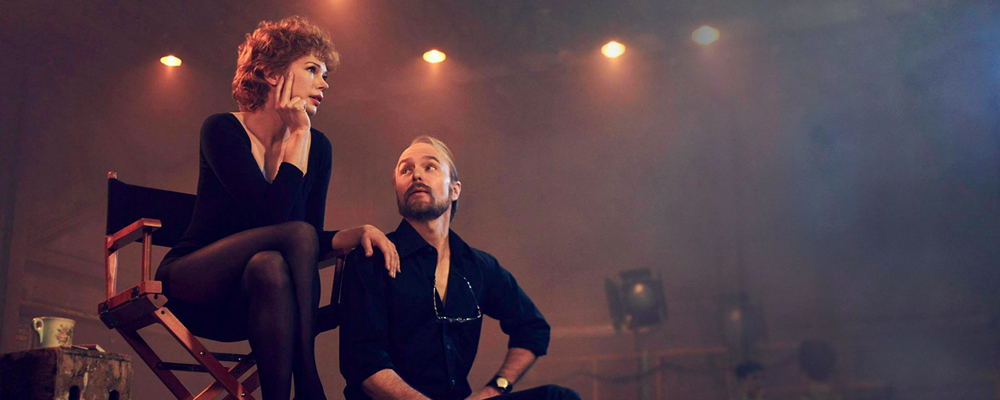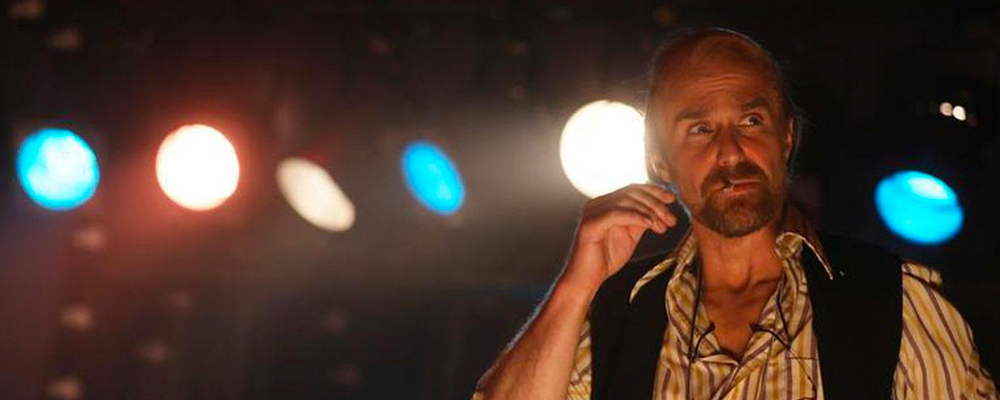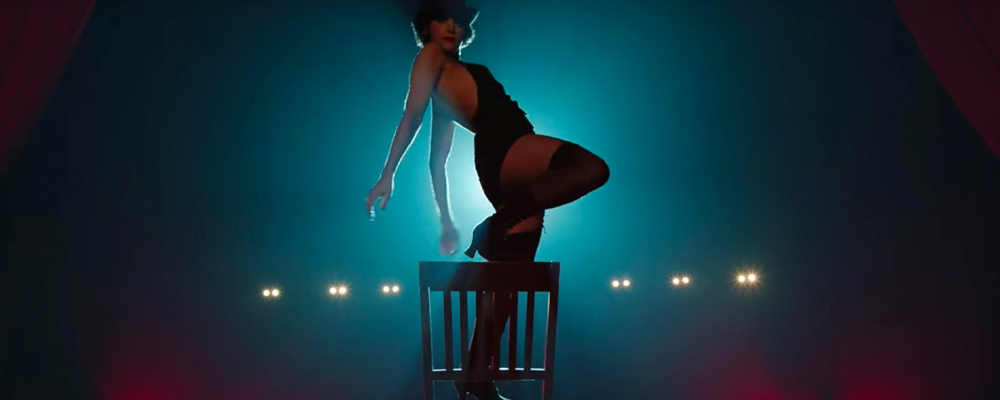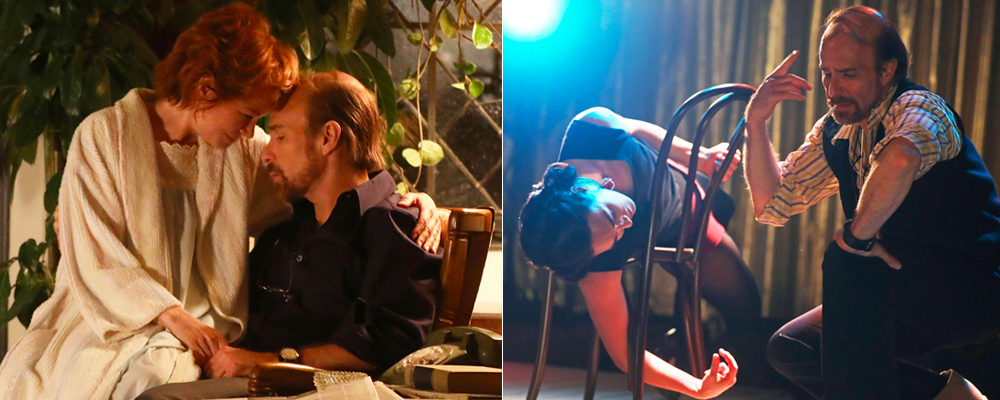‘Fosse/Verdon’ Feverishly Revives the Relationship Between Bob Fosse and Gwen Verdon
Alci Rengifo
In fittingly stylish fashion FX’s miniseries “Fosse/Verdon” dramatizes the beautifully creative, yet volatile relationship between Bob Fosse and Gwen Verdon. Two brilliant artists locked in unison makes for quite the explosive combo. This exhilarating production is about that and a lot more. It has much colorful flash, but it deals with the fact that honing a craft is hard work, how producing great art is draining, and how genius rarely makes up for human flaws.
We open on dancer, choreographer and stage titan Bob Fosse (Sam Rockwell) directing his feature film debut, “Sweet Charity,” in the late 1960s. It’s a colorful, standard musical gig but Fosse has high hopes. His muse and second brain is wife and fellow dancer Gwen Verdon (Michelle Williams), every bit his equal in drive and talent. When “Sweet Charity” bombs hard at the box office, costing the studio $20 million, Fosse is left looking for a comeback. When producer Cy Feuer (Paul Reiser) reveals over dinner that he’s overseeing a film adaptation of the musical “Cabaret,” Fosse jumps at the opportunity. He gets the job and starts shooting in Munich, with Feuer breathing down his neck, not understanding Fosse’s gritty take on the material, which is set in Weimer Germany. Back home in the U.S. Verdon is left taking care of their daughter and focusing on some of her own work. But as Fosse dives deep into crafting “Cabaret,” he also gives in to some of his impulses, like seducing the German translator. Feeling lost he brings Verdon over to the set and she immediately breathes new life into the production, helping Fosse with everything from set-ups to wardrobe. It’s a fantastic partnership, but Fosse’s own inner demons and habits are always waiting to lurk back up to the surface.
“Fosse/Verdon” is absorbing drama and a great slice of recent film history. One of the main producers is Joel Fields, one of the minds behind FX’s acclaimed “The Americans.” He brings along a handful of writers from that show to help craft this miniseries. The result is a portrait of Fosse and Verdon that feels intimate yet grand. The first episode travels back to the period in the late 60s and early 70s, when popular culture was changing forever and cinema was going through a revolutionary transformation. Film buffs will delight in the references to the time and backdoor insights into the making of a classic like “Cabaret.” We know it will be a hit, winning more Oscars than “The Godfather” in the year the latter would take Best Picture. But the Fosse in the series can’t know this yet, and one of the joys here is watching the creative process, the long hours and perfectionist ethic. Sam Rockwell plays Fosse like a mind that’s always working, seeking the perfect dance step or camera shot. Feuer loses his wits as Fosse insists on intense rehearsals, making the cabaret dancers rehearse numbers over and over. We get flashbacks to his younger days as a performer, learning the hard truths about honing a skill. A younger Fosse practices onstage, and a director tells him there’s always someone better that can make him replaceable. Rockwell also brings an elegant style to the role. He renders the Fosse from the historical photos and interviews perfectly, moving gracefully with a cigarette dangling from his lips. Like many a self-indulgent, some might say selfish, success he gives in to desires, as if searching for stimulation. He loves Verdon, but can’t stop himself when meeting an enticing prospect on set.
The beauty of this miniseries is that is not just about Fosse. It is equally about Verdon, who was herself a highly respected, recognized star as well. When “Sweet Charity” opens, fellow artists openly mock how Verdon was passed over for the lead role for Shirley MacLaine. Michelle Williams brings Verdon to life with great charisma and empathy, devoted to Fosse even if she knows he’s flawed, gloriously flawed. The series also makes it clear Fosse was not a one-man show, and it’s Verdon who feeds his imagination and helps him make better choices in his work. In a sense “Fosse/Verdon” challenges the mythic status of genius, acknowledging that rarely, if ever do big names make it to the top without help. When Fosse is unsatisfied with a gorilla costume for a famous scene in “Cabaret,” Verdon naturally offers to fly to New York to find a proper option. But when she returns with the prop to their hotel and knocks at the door, we see Fosse with a lover in bed. Part of the structure of the series is to end by moving forward to the last moments of Fosse’s life, as he and Verdon, now aged in the 1980s, prepare to head out to an event. Those familiar with this history know where it’s going, what the series is doing is tracking this relationship to this final moment, when the curtain will close.
“Fosse/Verdon” also has great fun reviving other notables from its era. Kelli Barrett plays an overly enthusiastic Liza Minnelli and Nate Corddry appears as Neil Simon. There are also masterful re-creations of classic Fosse film scenes, like the “Big Spender” sequence from “Sweet Charity” and the nightclub “Mein Herr” number from “Cabaret.” Like many great dramas about creative minds, we see how Fosse’s own personal tastes, habits and discipline shape what he puts onscreen.
“Fosse/Verdon” will be a treat for those familiar with the work of these two artists, but it may also prove to be revelation for those uninitiated. It introduces us to two people who define the fevered environment of working in a creative field. There is much glamor and excess, sure, but getting to the top is more work than play.
“Fosse/Verdon” premiers April 9 and airs Tuesdays at 10 p.m. ET on FX.




